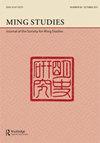Global Entanglements of a Man Who Never Traveled: A Seventeenth-Century Chinese Christian and His Conflicted Worlds
IF 0.3
0 ASIAN STUDIES
引用次数: 6
Abstract
elites), and reinventing social traditions to evade taxes such as in the case of the god Guandi who was made into an ancestor for this reason. Szonyi sums up the types of strategies military households used in the Ming and thereafter: strategies of optimization, strategies of proximity, strategies of regulatory arbitrage, strategies of precedent (p. 216), all of which he postulates were a means to optimize the difference between rules and social reality. In effect, what this means, Szonyi adds, is that the state and its agents were forced to accept the informal institutions and procedures that families and communities created to meet the demands made on them by the state. The Art of Being Governed is a book full of meaningful stories as well as thoughtful arguments, supported by maps, kinship charts, and a list of dramatis familiae which guide the reader’s journey into this “thick description” of military households in the Ming dynasty — it is a major contribution to Chinese social history and will prove a useful source for comparative history of other regimes. Unfortunately, as Szonyi admits, there is little said about women except a brief mention about the matter of marriage strategies, and the episode of the pirate’s sister. Szonyi has validated the efficacy of using the genealogy as a tool of historical documentation, but it is basically a recording of patrilineal history, and thus one would like to know more about the role of women in junhu and gender relations within these families in general. Szonyi does not underestimate the significance of marriage strategies in the re-territorialization of military households, and thus this is a topic which needs further research and attention — as he writes, “this role for women may have been even more important than for civilian households” (pp. 116–17). One final observation, in an age of global history, The Art of Being Governed seems to blend in with the wider trend of de-emphasizing the centrality of the state. In its place has come a greater appreciation of the web of local institutions supporting polity, and the complex threads of political actors and ordinary people both in confluence and at variance with each other. With this book, Szonyi has added new insights into this intricate and complicated relationship, and thus made a major contribution to the study of Chinese history as well as historical scholarship in general.一个从未旅行过的人的全球纠缠:一个17世纪的中国基督徒和他的冲突世界
精英),以及重塑社会传统以逃税,比如关帝因为这个原因而成为祖先。Szonyi总结了明代及以后军户使用的策略类型:最优化策略、邻近策略、管制套利策略、先例策略(p.216),他认为所有这些都是优化规则与社会现实之间差异的手段。Szonyi补充道,实际上,这意味着国家及其代理人被迫接受家庭和社区为满足国家对他们的要求而建立的非正式机构和程序。《被治理的艺术》是一本充满有意义的故事和深思熟虑的论点的书,有地图、亲属关系图、,以及一份家庭戏剧清单,引导读者进入对明代军户的“厚描”之旅——这是对中国社会史的重大贡献,将成为其他政权比较史的有用来源。不幸的是,正如Szonyi承认的那样,除了简短地提到婚姻策略和海盗妹妹的故事外,很少有人谈论女性。Szonyi已经验证了将家谱作为历史文献工具的有效性,但它基本上是对父系历史的记录,因此人们希望更多地了解女性在军户中的作用以及这些家庭中的性别关系。Szonyi并没有低估婚姻策略在军人家庭重新属地化中的重要性,因此这是一个需要进一步研究和关注的话题——正如他所写,“女性的这一角色可能比平民家庭更重要”(第116-17页)。最后一个观察结果是,在全球历史的时代,《被治理的艺术》似乎与更广泛的去强调国家中心地位的趋势相融合。取而代之的是,人们更加欣赏支持政治的地方机构网络,以及政治行为者和普通人之间相互融合和分歧的复杂线索。通过这本书,宋义对这种错综复杂的关系有了新的认识,从而对中国历史研究和史学界做出了重大贡献。
本文章由计算机程序翻译,如有差异,请以英文原文为准。
求助全文
约1分钟内获得全文
求助全文

 求助内容:
求助内容: 应助结果提醒方式:
应助结果提醒方式:


